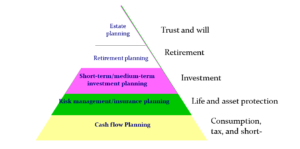By Chong Kok Loong, Senior Lecturer, School of Business
Personal Financial Planning.
Managing Personal Finance is a very important area which requires individual attention and also requires proper planning too. Personal financial planning could be divided into a few stages mainly,
- Cash Planning.
- Insurance Planning.
- Investment Planning.
- Retirement Planning.
- Estate Planning.

Cash Planning.
Cash flow planning aims to achieve a balanced or even a surplus cash flow. A balanced or a surplus cash flow means that there is always sufficient cash to pay for one’s needs and wants. Cash and cash equivalents are current assets as they are short- term, highly liquid, and readily convertible into cash within a short period of time (usually less than 12 months). They include coins and notes, current accounts, savings accounts, foreign currency accounts and short-term investments. Cash flow is the change in the balance of the cash and cash equivalents. The purpose of cash flow planning is to ensure that the monthly income generated will exceed the monthly expenses. This is to ensure that there will be savings for the individual. Thus, with the savings accumulated, the individual would be able to proceed with investment planning.
Many who do not carry out cash planning often end up spending more than their income. Hence, they will end up indebted and this refrain them from investment. Investment is definitely a very important part of financial planning as this is the start of creating passive income which enable them to proceed with retirement. In cash planning, one is required to conduct a cash budget. This cash budget will show itemized items of one’s spending. It is through such list, one could see clearly their unnecessary spending and eliminate it.
Risk Management and Insurance Planning
The purposes of risk management are to avoid risk, to reduce risk, and to transfer risk. A plan to manage risk and to compensate for financial losses must be one of the components of financial planning. The ultimate objective of this planning is to protect one against financial losses.
Previously, we mentioned about the importance of cash planning where through cash planning we hope to generate savings which enable investment. If one has accumulated sufficient cash for investment, however some unexpected incidents such as accident, falling ill causing a huge cash payment involved, the accumulated cash would be forced to be drain for the unexpected losses. Hence, the entire investment plan would not be able to take off.
Therefore, it is extremely crucial for one to conduct a proper and comprehensive insurance planning so that he or she will be protected. In insurance planning, one need to spot all the potential risks that can prevent them from achieving their financial goals. This can be done with the assistance of a financial planner. In insurance, the three common pure risks are personal risk, property risk, and liability risk. Personal risk includes risk of early death, injury, or debilitating illness, and loss of income through incapacity to work. Property risk takes into account the loss or damage to property. Liability risk refers to the risk causing injury, damage, and financial loss to others.
Investment Planning.
The main objectives of investment is to enable one to take some activities which would help them to generate extra income. This income could be then used to support their retirement plans. There are a few factors to consider in investment planning:
- Return
The gain or loss from an investment is called the return. For securities return, there are two components. The first component is the cash received from the investment. For instance, cash dividend is the cash component of the return from securities investment and interest is the cash component of the return from loan investment. The second component is the capital gain or capital loss due to the difference in the prices at which the investment is purchased and sold. While there are many ways to measure returns, we normally express return in percentage. The percentage return is the total dollar value as a percentage of the originally invested sum. The return of an investment is always one of the most frequently considered factors before making an investment decision.
- Risk
The next important factor to consider before investing is risk. This is one which is always been ignored by investors. There are many ways to measure and define risk, in the context of investment planning, we focus on financial risk related to investment. Commonly used risk measures are total risk (calculated as the standard deviation of return), market risk or systematic risk (measured by beta of the securities), and firm-specific or unsystematic risk (measured by the residual component of the variance). In order to attract investors to buy riskier securities, the market is willing to pay a compensation for the additional risk, called risk premium, which is the difference between the returns on a risky asset and a riskless investment. In an efficient market, the way to earn a higher return is to make investments with a higher level of risk. As there are so many investment instruments in the market, the main concern for investment is to select an investment strategy or asset allocation which yields the highest return with a tolerable level of risk. In order to construct a profitable asset allocation for the clients, the financial planners have to perform risk and return analysis for various asset allocations.
- Investment Horizon
Investment horizon is the length of time allowed to achieve the investment objective or the planned liquidation date. Investment instruments can be classified into long-term, intermediate-term, or short-term. Property investment is an example of long-term investment while securities investment can be relatively short-term. Investment in bonds and debentures can be of different time horizons: 6 months, 1 year, or 10 years. Therefore, the choice of investment vehicles depends on the investment horizon. In addition, the investment horizon is also a factor for investment volatility.
Retirement Planning
Retirement is a state one would have achieve financial freedom. Many interpreted retirement as a state where one doesn’t work and one must be old. This is absolutely a wrong interpretation. Retirement is where one has achieve financial freedom where there must be a source of income where the income generated must be able to support one’s expenses. Therefore, investment planning done before this is very crucial. The person can still be working but is not working for money, working can be treated as to fill up his or her time.
When conducting retirement planning one need to consider the following:
- desired retirement age
- probability of early retirement (voluntary or involuntary)
- expected lifestyle and living standard in retirement
- personal health condition
- sources of retirement income (social security, superannuation)
- amount of accumulated income for retirement purpose
- estimated income for retirement use
- plan to meet the deficiency in actual retirement income and estimated retirement income
- changes in medical insurance system
- inflation and market interest rate fluctuation
- periodic revision of retirement plan to adjust for the changes
Estate Planning
Estate plan is an arrangement upon the death of the estate owner. It should be prepared before the death. If one has managed their wealth and assets well through financial planning during the lifetime, there should be a substantial amount of wealth and assets accumulated. Hence, we should not let our estate to be left unattended. Therefore, we need to arrange our wealth and assets upon death. Estate planning is one of the planning areas of the comprehensive financial planning. Estate planning includes the management of an estate when the one is unable to handle the affairs for whatever reason; selection of estate planning tools; arrangement of assets and liabilities of the deceased; and achievement of the objectives of the deceased for the beneficiaries
There are a few commonly used tools in estate planning such as power of attorney, will and trust.
- Will
A will is a legally enforceable declaration and instruction of the estate owner on the estate when the estate owner dies. A will only becomes effective upon the death of the testator and is an essential instrument of estate planning. Although a will is so important, it is often ignored.
- Power of Attorney
Power of attorney is the right of one person to act on behalf of another person as embodied in a deed. By using the power of attorney, the estate owner authorizes a person to act on the behalf of the estate owner as the will-maker and to distribute estate directly under certain conditions. As the will can only be effective to provide instruction upon the death of the testator, the power of attorney can provide direction even when the donor of power is still alive.
- Trust
A trust is a fiduciary arrangement by which the creator of the trust (grantor or settlor) transfers the estate under the management of the trustee (the fiduciary or the legal owner of the estate under the trust arrangement). The trustee handles the trust estate for the trust beneficiary (beneficiaries or equitable owners) according to the terms of the trust. A trust can be used as a supplement to a will; as a devise to allow amendments in the estate plan; and as a tax planning technique.
Based on the time when the trust is created, a trust can be categorized into two major types:
- Living (inter vivos) trust – A living trust is created when the testator is still alive.
For instance, the client can create a trust fund for the benefit of the surviving spouse and children during the lifetime.
- Testamentary trust (a trust under will) – A testamentary trust is set up as part of the terms of a will. While the trustees of a living trust can be the grantors themselves, the trustees of a testamentary trust can never be the grantors as a testamentary trust can only be effective upon the death of the grantor.
Financial planning is an area which requires a substantial amount of time of planning. However, the time spent is definitely worth it. A comprehensive financial plan will be able to lead one to achieve his or her goals

